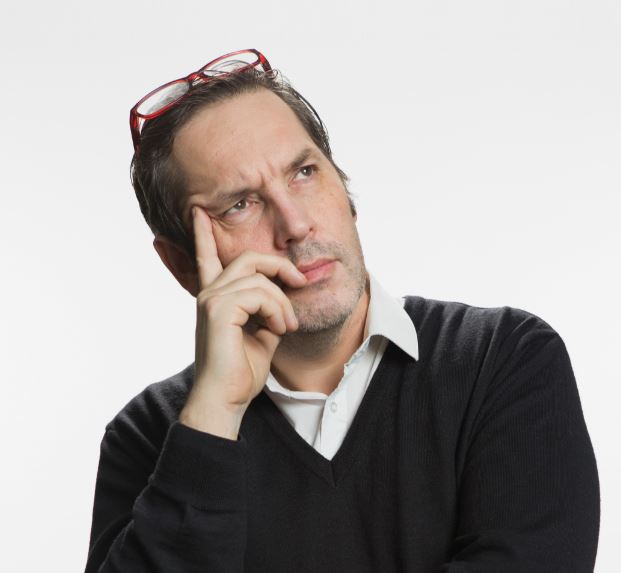
MEET WITH
Tom Dedeurwaerder
Director of the Atelier Groot Eiland
Credit: Freddy D'Hoe

It happens in West Brussels, in a workingclass district affected by social difficulties and precariousness.
Welcome to Molenbeek. Its name, deeply marked by the terrorist events of recent years, sounds like a repellent to some people. Yet, it is a completely different story, resolutely positive, that we are telling you today: the story of an association which invents new forms of solidarity and living together. Welcome to Molenbeek. Open the doors of Atelier Groot Eiland.
An association, a community, a philosophy
Molenbeek-Saint-Jean is a Belgian commune of the Brussels-Capital Region which covers almost 6 km2. It has many different faces. On the heights, the commune offers a modern and residential urban landscape bordered by green spaces. In its lower part, popular districts with colourful and lively shops, are animated by an essentially emigrant population.
Here, somewhere in the heart of Molenbeek, it’s quite busy. Some cook, others garden, work with wood or sell their products. This is Atelier Groot Eiland. Since 1986, this association has had the mission of fighting poverty through socio-economic integration. It organises work experience, education, adapted work and coaching courses for people who have stepped away from the job market. The results are impressive: on average, 59% of the beneficiaries find a job within six months of their experience at the Atelier. Another proof that this model works: the association and its activities are constantly expanding. In 2019, it had supported 308 people, three times more than it did five years ago.
This major ambition is guided by two main principles: giving everybody a chance and ensuring sustainable development. Indeed, projects must always be based on a sustainable and solidarity-based economy model, founded on three pillars: environmental, social and economic. Beyond this core mission of integration, this concretely translates into the creation of healthy products and fair services, limiting the environmental footprint as much as possible. This approach has been widely encouraged through the many awards the association has received, namely the "Good Food" label, the “Slim in de stad-prijs" award (Intelligent in the City), the "Molenbeekois of the Year" award and the Diversity label. The most recent one: the "Social Economy Prize", awarded in December 2019 rightly covers the scope of the initiative.
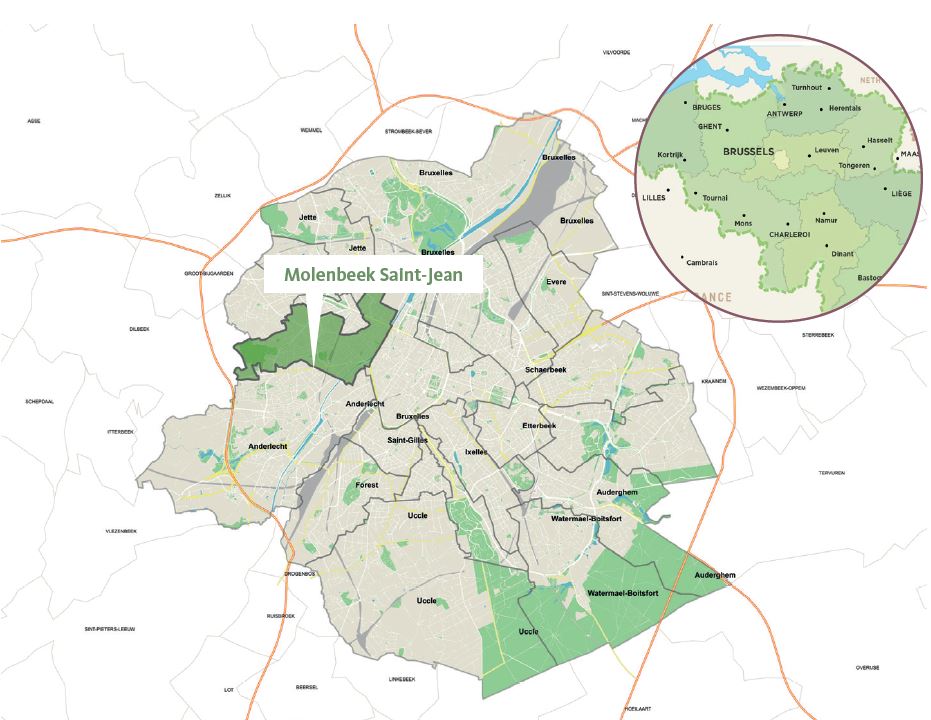
Concrete projects for crucial needs
Seven projects, structured as mini companies, were created thanks to the association. They complement each other in the areas of urban agriculture, food services, carpentry, handicrafts and sales. Their names? The Bel Mundo, and RestoBEL restaurants, the Bel'O sandwich shop, the five Bel Akker vegetable gardens, The Food Hub organic shop, the ArtiZan bakery and creative workshop, without forgetting the Klimop carpentry.
These projects come to life thanks to the men and women who embody them. The association welcomes people registered within the various regional employment offices for training, as well as those who benefit from employment aids through professional integration, apprenticeship or voluntary work contracts. These beneficiaries are of all ages and backgrounds, and they all have one thing in common, as Tom Dedeurwaerder, director of the structure, points out: "Everyone arrives with his or her own backpack of problems". Often in a situation of social distress caused by a lack of qualifications, long years of unemployment, a precarious situation or the hard knocks of life, the passage through the Atelier presents itself as a life saver. Beneficiaries learn how to work in teams by developing both their soft and hard skills. Learning is transversal. For example, Bel Akker's team dedicated to urban agriculture discovers how to sow, harvest, weed, compost — skills traditionally expected in the field of gardening — but also learns how to manage orders and establish customer relations. Logistics, sales, teamwork...
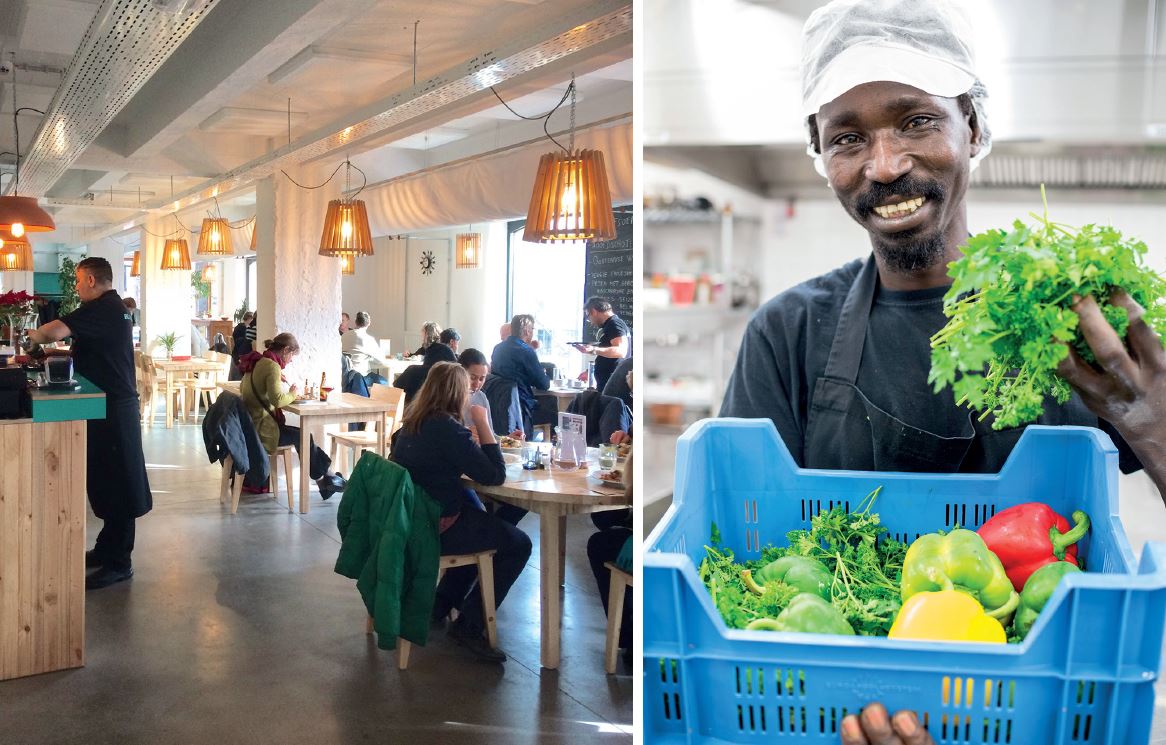
From producers to your plate. Zero waste objective, local and sustainable. Welcome to Bel Mundo restaurant!
Inclusion as a key word
Diversity, non-discrimination and integration are at the heart of the association's DNA, from the teams in the field and employees to the Board of Directors, which has also evolved in this direction. "There is parity between women and men. It includes young people and seniors. Finally, two of the seven members are of foreign origin" the association confirms.
In order to fight against all forms of discrimination during recruitment, it is naturally motivation, personal expectations, skills and life experience that take precedence in the election of candidates. "We have to offer work to everyone while respecting the quality and sustainability of our social economy", Tom Dedeurwaerder, director of the organisation says. "We expect our employees to respect their colleagues, customers and suppliers, regardless of their origin, gender, nationality, religious or philosophical beliefs, sexual orientation or even disability", he adds.
A virtuous circle
At the Atelier, the human factor is combined with respect for the environment and the circular economy. Objective zero waste! The projects carried out are always thought out according to their complementarity but also in connection with other local actors.
Thus, the carpentry mainly uses sawmill residues and for the rest, wood from sustainably managed forests. Up-cycling is also on the agenda, and the frames of old school chairs are also recycled. At the end of production, nothing is lost because the remaining sawdust is used in the compost of the Bel Akker vegetable garden, where used coffee powder recovered from Nespresso awaits it.
The Bel Mundo restaurant takes care of food waste. It bases its weekly menu on the harvest from the vegetable gardens and unsold food from the morning market. It has also established a partnership with the Delhaize supermarkets, which supplies it with products nearing their expiry date. Even ketchup is home-cooked with the tomato's surplus. In 2019, this technique enabled the restaurant to prepare 27,196 meals and recover 15 tons of food.
By respecting the precept of zero waste, the association logically hunts down polluting packaging. Buzzers replace tickets to recover the dishes, and reusable cups and glasses are available in all restaurants! The association has even acquired a sewing machine to replace plastic packaging with cloth bags.
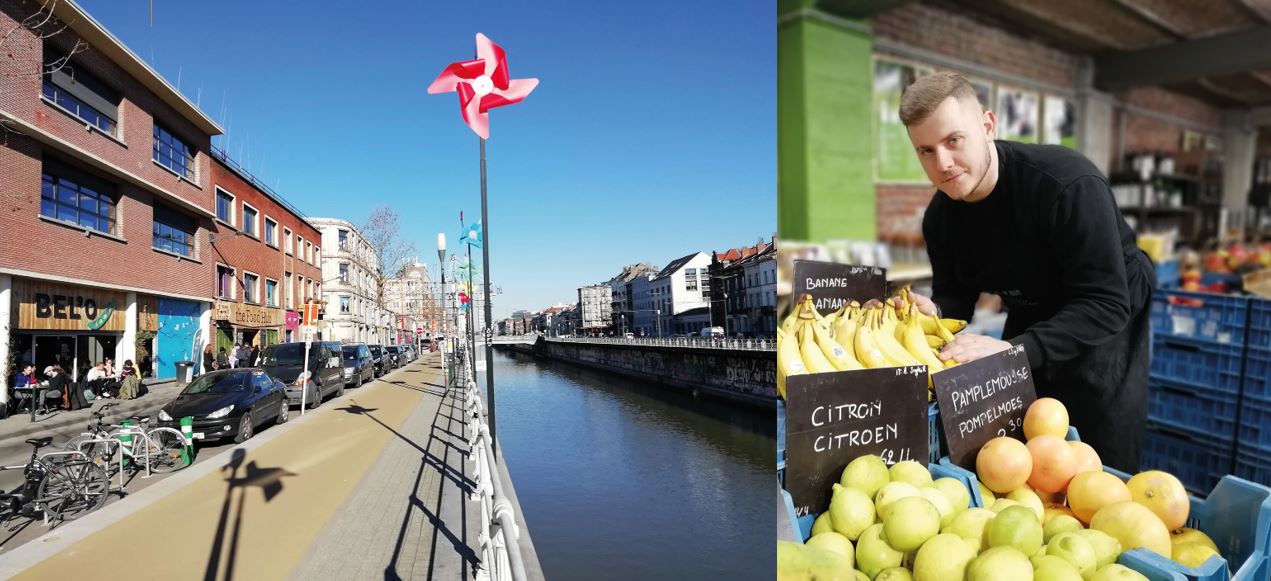
On the left, Bel'O, the sandwich shop and The food Hub, the organic food shop, meeting and refilling places for locals as well as tourists. / On the right, Social, sustainable and ecological, the virtuous circle of "The Food Hub".
Apprentices, the grains’ keeper
The five Bel Akker vegetable gardens are flourishing. They extend over almost one and a half hectares in the four municipalities of Molenbeek, Anderlecht, Brussels-City and Jette. Vegetables and herbs are grown here according to the principles of organic farming and SPIN (Small Plot Intensive). Planting, weeding, harvesting... Here, it's tailor-made and the gardeners take care of everything.
This high-quality production is sold through the restaurants and The Hub, the association’s shop. Various well-known restaurants in Brussels also have these vegetables on their menu and the association's delivery employees travel around the city on cargo bikes to supply these high-end customers. Products from the vegetable are also very popular with the residents who are keen to eat local.
As a result of these multiple initiatives, the concepts around urban agriculture have evolved. Initially based on the model of "high value crops", the first vegetable gardens found their place behind the former Belle Vue brewery in Molenbeek, on the roof of the Abattoir or in the municipality of Anderlecht. Helifarm was then established in the North District of Brussels-City. This is a professional urban vegetable garden and a communal garden in which the inhabitants can take part to. In this way, the vegetable garden becomes a meeting and exchange point in the neighbourhood. This action is carried out in collaboration with the Velt and De Harmonie associations with the aim of increasing social cohesion around this site. To nourish this dynamic, Helifarm organises free workshops on ecological urban agriculture every month. Finally, the newest addition, the one-hectare site garden CourJette. Located on the site of the Universitair Ziekenhuis Brussel, this garden is an agricultural project totally supported by the community. The inhabitants who wish to do so, support the farmer through an annual contribution and in return receive a share of the harvest, a system also known in Belgium as GASAP (Groups for the Solidarity Purchase of Peasant Agriculture).
Broadening…
As you will have noticed, the Atelier Groot Eiland’s philosophy is based on openness to others and collaboration with various organisations. It thus works with more than 50 Brussels partners who accompany, complement or finance their activities. This network is composed of public sector organisations, socio-professional integration associations, training centres, municipalities, local businesses, among others. Sharing and collaborating are at the heart of the model. In this spirit, the Atelier shares its experience through the organisation of guided and interactive tours for universities, colleges, secondary schools and even for international actors curious about this approach in the metropolitan context of Brussels.
Today, Atelier Groot Eiland wishes to step-up in order to train and insert more and more candidates. With this in mind, it is now grouping together with the Great and Eat association a pooling of resources that will hopefully lead to even more impact and positive stories in the heart of Molenbeek.

MEET WITH
Director of the Atelier Groot Eiland
Credit: Freddy D'Hoe

MEET WITH
Director of the Atelier Groot Eiland
Credit: Freddy D'Hoe
"Brussels is a cosmopolitan city and one of the keys to giving everyone a chance is to accept our differences"
What is your motto?
"We don't want to give a man a fish, we want to teach him how to fish". Through socio-professional integration, we want our beneficiaries to integrate into the labour market and become autonomous. What does it mean to give a chance? If I approach the subject by thinking about my personal background, I was able to study as an engineer, I never questioned if it was possible. I had a flat, my parents supported me. I was very lucky, I never doubted about these aspects, I thought it normal. A lot of people weren't so lucky, nor did they have the means to develop their passion or talent. We want to give them that chance.
Could you share a particularly striking story that encourages you?
Stories, there are plenty of them ... For example, one of a young man from the neighbourhood who found his place in society by discovering his qualities as a cook during his internship. From that moment on, his pride is knowing that at the end of the day, by preparing good food, he makes people happy. After his time at the Atelier, he landed a quality job in the kitchen of a hotel.
Also, the story of this woman who arrived from a shelter, victim of domestic violence, isolated from her children and found herself demotivated and without selfconfidence. By giving her a chance, accompanying her and listening to her, she finally opened her own grocery store, regained her independence while benefiting the community. Proving that work is more than just a salary, she finally got back in touch with her children and grandchildren and resumed family life.
There is also this woman who has completed a very good internship and has been hired. However, her employer came back to us very happy with her work but sorry for her lack of punctuality in the morning. Talking with her, we identified that she was dependent on the day-care's hours and the difficult tramway connections to get to work. In concrete terms, we helped her to get a bicycle and to take driving lessons in the city. Since then, punctuality problems are behind her. Each person has a unique route. Here we try to adapt as much as possible to find "à la carte" solutions.
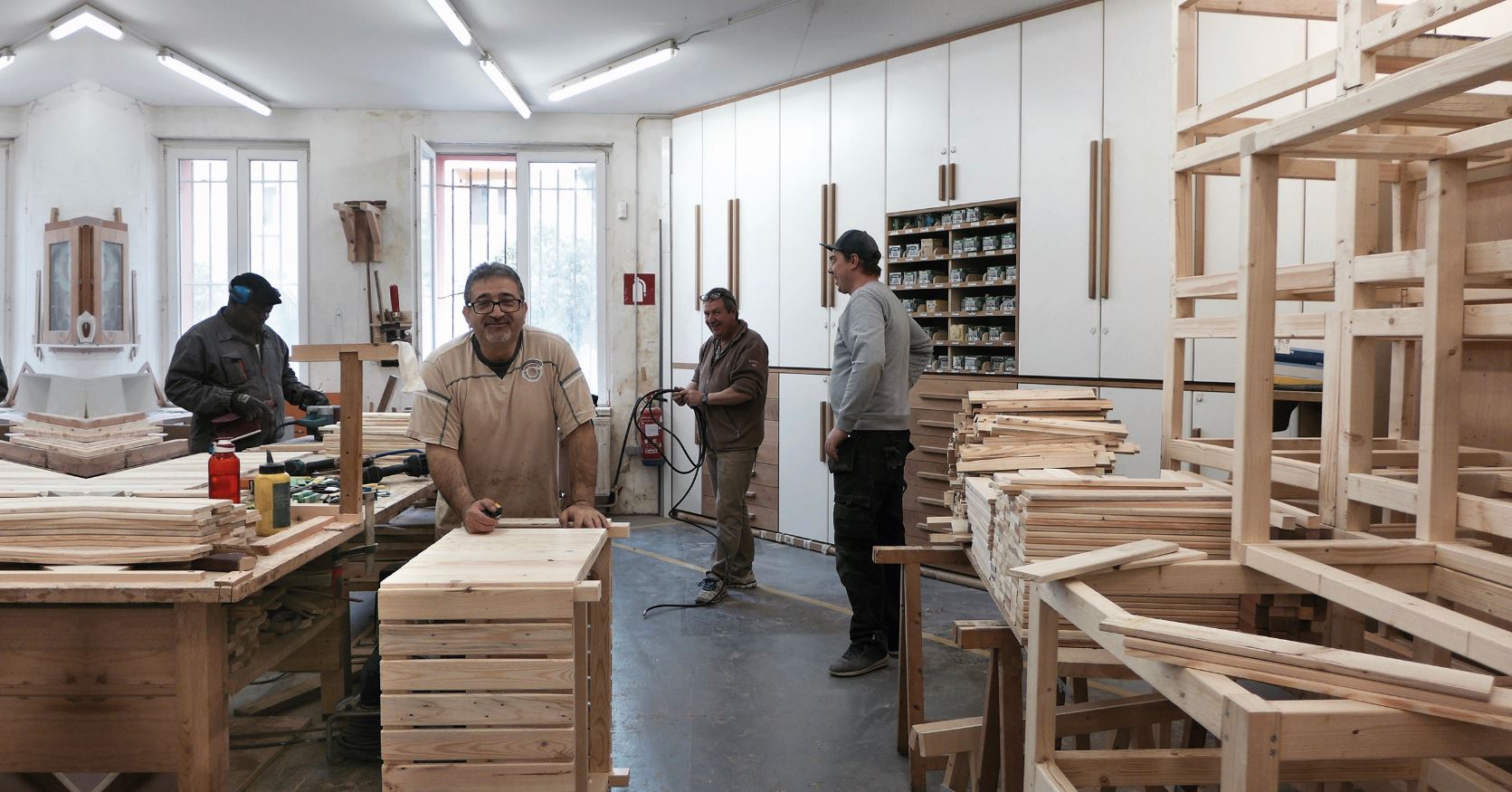
The profiles of your beneficiaries and employees are indeed very diverse. How does the association benefit from this diversity?
First, when we talk about diversity, we're talking about it in the broadest sense. Diversity is not just limited to skin colour, origin or language. There are men, women, people with diverse and varied cultures, orientations, religions.
For us, diversity is a reality in the field. Brussels is a cosmopolitan city and one of the keys to giving everyone a chance is to accept our differences. We expect our employees to respect their colleagues, customers and suppliers, regardless of their origin, gender, nationality, religious or philosophical beliefs, sexual orientation or even disability.
Diversity is a great richness in every part of our organisation. Whether within the Board of Directors or in the field with our teams and beneficiaries, it offers different points of view and perspectives. It allows us to communicate better because the message is stronger when it comes from someone recognised in the community. It also gives us the keys to better understand certain fractures within our society that come from a mutual cultural misunderstanding. It also allows us to find concrete solutions.
You are 60% publicly funded. Do you aim to achieve a balance?
We are not trying to stop relying on any subsidies. It is important that we continue to be supported in some of our activities to allow us, for example, to devote training time to our beneficiaries. We want to give everyone a chance and we must not sacrifice this major principle for profitability.
However, increasing our independence is also very important. The income generated allows us to invest in projects that are important to us and which do not necessarily find an echo in the grants we receive. This independence also strengthens our other pillar of sustainability. We do not want that a political punctual change ruins a project that took years to build up.
You are helping to create a strong dynamic in Molenbeek. How do you see this neighbourhood evolving?
We have an ambassadorial role. You should know that the situation in Molenbeek is not easy. Our commune is the second commune in Belgium with the lowest average per capita income. The attacks have given a bad image of our population. But our achievements show that there are also good things happening in Molenbeek. Our role is to think about innovative, "out of the box" concepts.
We are convinced that we should not try to reinvent the wheel. We don't hesitate to collaborate with other associations and organisations that are already working in other fields and with whom we can build bridges. For example, by working with a medical house. It sends us people who have been diagnosed with a medical condition (burnout, psychiatric difficulties, etc.) and we help them in other aspects of life.
Always with the aim of making itself known and bringing the community to life, the association stimulates tourism in Molenbeek by offering various workshops and team building days in collaboration with other local associations such as Imal Fablab, la Fonderie, Fermenthings.
Finally, we have a very important role to play in representing our people vis-à-vis the political power. We call on politicians to integrate the inhabitants into projects, to avoid gentrification, to improve the standard of living in general without discriminating against the current population.